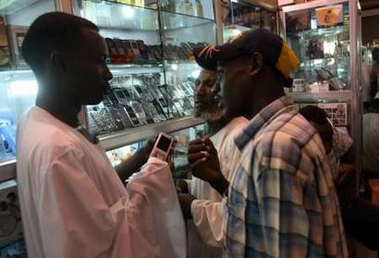
Kenya's mobile phone giant Safaricom went public today, and its shares soared 60% on its debut. Following-up from a post I did last year, the east African / sub-Saharan mobile phone market is red hot.
Africa
Rappelle Moi: Ringing Mobile Phones In Sub-Saharan Africa
Now I'm going to totally sound like the libertarian, amateur economist and paid blogger, Megan McArdle, but this is an interesting story about how cash-strapped mobile phone users in Africa ring their friends and pass-on their phone number without paying for a call. Then, their presumably more affluent friends decide to call back at their own expense. This is a phenomenon that doesn't happen much in western countries because most mobile phone users have contracts with a set base fee each month. But in countries where most users pay as they go and accumulate credits, this happens. Think of it as third-world paging.
Phone credit low? Africans go for "beeping"
By Andrew Heavens
Reuters
Wed Sep 26, 11:32 AM ET
If you are in Sudan it is a 'missed call'. In Ethiopia it is a 'miskin' or a 'pitiful' call. In other parts of Africa it is a case of 'flashing', 'beeping' or in French-speaking areas 'bipage'.Wherever you are, it is one of the fastest-growing phenomena in the continent's booming mobile telephone markets -- and it's a headache for mobile operators who are trying to figure out how to make some money out of it.
You beep someone when you call them up on their mobile phone -- setting its display screen briefly flashing -- then hang up half a second later, before they have had a chance to answer. Your friend -- you hope -- sees your name and number on their list of 'Missed Calls' and calls you back at his or her expense.
It is a tactic born out of ingenuity and necessity, say analysts who have tracked an explosion in miskin calls by cash-strapped cellphone users from Cape Town to Cairo.
"Its roots are as a strategy to save money," said Jonathan Donner, an India-based researcher for Microsoft who is due to publish a paper on "The Rules of Beeping" in the high-brow online Journal of Computer Mediated Communication in October.
Donner first came across beeping in Rwanda, then tracked it across the continent and beyond, to south and southeast Asia. Studies quoted in his paper estimate between 20 to more than 30 percent of the calls made in Africa are just split-second flashes -- empty appeals across the cellular network.
The beeping boom is being driven by a sharp rise in mobile phone use across the continent.
Africa had an estimated 192.5 million mobile phone users in 2006, up from just 25.3 million in 2001, according to figures from the U.N.'s International Telecommunication Union. Customers may have enough money for the one-off purchase of a handset, but very little ready cash to spend on phone cards for the prepaid accounts that dominate the market.
Africa's mobile phone companies say the practice has become so widespread they have had to step in to prevent their circuits being swamped by second-long calls.
"We have about 355 million calls across the whole network every day," said Faisal Ijaz Khan, chief marketing officer for the Sudanese arm of Kuwaiti mobile phone operator Zain (formerly MTC). "And then there are another 130 million missed calls every day. There are a lot of missed calls in Africa."
'CALL ME BACK'
Zain is responding to the demand by drawing up plans for a "Call-me-back" service in Sudan, letting customers send open requests in the form of a very basic signal to friends for a phone call.
The main advantage for the company is that the requests will be diverted from the main network and pushed through using a much cheaper technology (USSD or Unstructured Supplementary Service Data).
A handful of similar schemes are springing up across Africa, says Informa principal analyst Devine Kofiloto. "It is widespread. It is a concern for operators in African countries, whose networks become congested depending on the time of day with calls they cannot bill for.
"They try to discourage the practice by introducing services where customers can send a limited number of 'call-back' request either free of charge or for a minimum fee."
There are plenty of other reasons why mobile operators are keen to cut down on the practice. One is it annoys customers, pestered by repeated missed calls.
A second is that 'flashes' eat into one of mobile phone companies' favorite performance indicators -- ARPU or average revenue per user. Miscalls earn very little in themselves - and don't always persuade the target to ring back.
Orange Senegal, Kofiloto said, lets customers send a 'Rappelle moi' ('Call me back') when their phone credit drops below $0.10. With Safaricom Kenya, it is a "Flashback 130" (limited to five a day -- and with the admonishment 'Stop Flashing! Ask Nicely'). Vodacom DR Congo's 'Rappelez moi SVP' service costs $0.01 a message.
MORE THAN MONEY
But beeping is not only about money. Donner's 'Rules of Beeping' suggests a social protocol for the practice.
"The richer guy pays," he writes. It is acceptable to beep someone if you are short of cash and they are flush with credit. Never beep someone poorer than you.
Never beep someone you are tapping for a favor. You don't want to risk annoying the person you are trying to win over. Never flash your girlfriend, unless you want to look cheap.
"Most beeps are requests to the mobile owner to call back immediately, but can also send a pre-negotiated instrumental message such as pick me up now,' or send a relational sign, such as I'm thinking of you,'" the paper says.
It can go even further than that.
Cameroonian researchers Victor W.A. Mbarika and Irene Mbarika identified a different kind of beeping-powered relational call in a study for the technology association the Institute of Electrical and Electronics Engineers (IEEE).
"Lovers often communicate with text messages or beeping'," said the study. "One party dials another's number and then hangs up. One ring could mean, I am here,' two rings, Call me now.'"
And the name they gave this new entry in the beeping lexicon? Borrowing a street slang term for an appeal for sex, they christened it "the booty call."
Copyright © 2007 Reuters Limited




